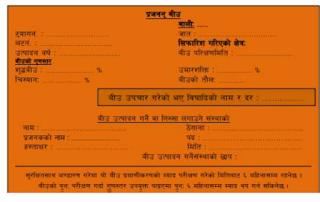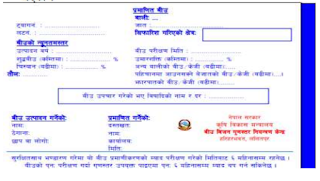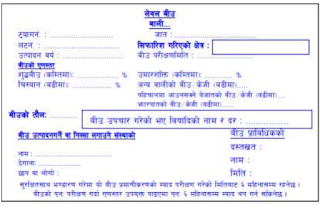Embryonic plant enclosed by protective covering is a seed. These
are the merchandise of the ripened ovule. Similarly, Seed Certification is
a process designed to take care of the quality of seeds during seed production,
post-harvest operation, and distribution of seeds. Seeds that are intended for distribution in domestic and international markets are controlled in quality and inspected by the certification agency to make sure consumers get good seeds by the seed certification system. This process was first implemented in Nepal in
wheat.
Seed certification could be a process designed to need care of and make available to the farmers endless supply of top quality seeds and propagating materials of notified kinds and kinds of crops, so grown and distributed to form sure the physical identity and genetic purity. The most function is to encourage the yield of adequate quantities of genetically pure and good quality seeds, particularly high potential, improved, and hybrid kinds of different crops. The most responsible seed certifying body in Nepal is Seed quality control Center (SQCC), MoAD.
The procedure of seed certification
- Source seed verification is the start of the Seed Certification
Program. Unless the seed is from an approved source and of
designated class certification agency won't accept the seed field for
certification, thereby ensuring the utilization of top quality true to type
seed for sowing of seed crops.
- Evaluation of the growing crop on the sector for varietal purity, isolation of seed crop is to stop out-cross, physical mixtures, disease dissemination and also ensure crop condition as to the spread of designated diseases and thus the presence of objectionable weed plants, etc. to the spread of
designated diseases and therefore the presence of objectionable weed
plants, etc.
- Planting value assess, of the seeds by laboratory
tests. The certification agency take samples from the seeds produced under the certification program and
puts them under germination test and other purity tests required for
proving to varietal purity.
- Here the samples drawn from the source and final seed
produced are grown side by side alongside the quality samples of the
variability in question. By comparison, it's determined whether the varietal purity and health of the produced seed are almost like the results from the sector inspection. Last And lastly, evaluation of the seeds
for their genuineness to species or varieties or seed-borne infection.
- The samples drawn from the lots are grown within the field
alongside the standard checks. Growing plants are observed for
varietal purity. The grow-out test helps to eliminate the
sub-standard seed lots.
- If the report is satisfactory, fulfills all the standards of purity
and health, then it's collected and stored or transferred to a nursery for
sowing or storage alongside tagging with the tags of various tags which
incorporates the name of the producer, name of species, date of
collection, locality factor, climatic condition, soil condition and
quality of seed.
Classes of seed
Basically, there are two different classes of
seed ie
1. Seed
certification system
- Breeder seed (prajanan biu)
- Foundation seed (mul biu)
- Certified seed
- Improved seed (unnat biu)
2.
Truthful labeling system
- Breeder seed (prajanan biu)
- Source seed (short bio)
- Label seed (label biu)
- Improved seed (unnat biu)
On the idea of seed certification system
1. Breeder Seed (Prajanan biu)
- It's the seed that's directly controlled by the
plant breeder of the breeding program who developed the seed or
institution involved in seed development.
- It's the source for to surge the number of
foundation seeds.
- It's available in small quantities.
- The breeder seed has genetic purity-100%,
Physical purity - 100%, weed seed and other seed- 0%, Insect and diseases
- 0%
- It's a tag with brown color background and
written in black color and signed by the breeder who developed the seed.
2.Foundation seed (mul biu)
- The seed produced from the breeder seed under the
supervision seed production specialist is understood as a foundation seed.
- Foundation seed production is administered by the
person, or institutions, or agencies who have taken permission from NARC
research stations, or Government farms
- The overall standards for foundation seed are as
follows: Genetic purity- 98%, Physical purity over 95%, min germination
percent 80 - 85%
- It's a tag with white color background and
written in black color and signed by seed certifying officer and seed
producer.
3.Certified seed (certified seed)
- The seed produced from the foundation seed under
the supervision of seed scientists or seed specialists is understood as
certified seed.
- Certified seed is produced by the person,
company, cooperative, or institution who have taken permission for
production from a Government farm, research facility, or from a related
authorized body.
- The overall standards of certified seed are as
follows: Genetic purity- 98%, Physical purity - 98%, and minimum
germination percent- 80, Inert matter 2% or less.
- It's a tag with white color background and
written in blue color and blue color band on the left side of the label
and signed by seed certifying officer and seed producer.
4. Improved seed (UNNAT biu)
- The seed is produced either using
foundation or certified seed of the crops under the supervision of seed
producer and / or seed specialist. - The improved seed is employed
for the commercial production of crops.
- The improved seed is produced in mass scale /
large quantities by seed-producing farmers or the seed-producing
cooperatives.
- The field inspection is completed during the crop
standing in the field by seed certifying agency, isolation distance is
maintained considering pollination of the crops and other principles of
seed production is followed.
- It's a tag with yellow color background and
written in black color and signed by seed certifying officer and seed
producer.
On the idea of the Truthful Labeling System
1. Breeder Seed (Prajanan Biu)
- The company, or cooperative, or Institution that
has taken permission for varietal development can produce seed.
- The breeder seed is produced by the breeder of
the seed company or Institution involved within the varietal development
program.
- Breeder seed should be genetically
100% pure. It should be free from seeds of other crops,
varieties, weed seeds, diseases, and insects.
- After production and processing, seeds are
often stored with the joint signature of the breeder, representative of
the related institution, and of certifying agency as prescribed in annex 1
of seed certification directive.
- It's a tag with brown color background and
written in black color and signed by the breeder who developed the seed.
2. Source seed (Shrot Biu)
- The stander and quality of the source seed should
be like foundation seed.
- The private seed company, institution, agency, or
individual who have taken permission for seed production can produce source
seed from breeder seed.
- The source seed is produced under the supervision
and control of seed specialists of private-run companies, or cooperatives,
or institution.
3. Label Seed
- Quality and the standard and stander of label
seed should be like certified seed
- The seed company or institution or one that has
taken permission for foundation seed production can produce label seed.
- The label seed is produced under the supervision
and control of seed specialists from a private company or institution.
4. Improved seed (Unnat Biu)
- Improved Improved seed is produced under own
supervision and control by producer and quality and stander of seed is
maintained and produced as needed by pollination behavior of crops
- The improved seed is employed for commercial
production of crops.
- The joint signature of seed producer and
processor, and seed specialist involved, the logo of seed company must be
maintained with seed storage.
Importance of seed certification system.
- to make sure genetic identity of a spread.
- to make sure high degree of physical purity. to
make sure a high degree of germination.
- to make sure freedom from all designation seed-borne diseases,
weeds, and other crop seeds
- to provide top-quality seed to farmers and other growers.
Good crop production begins with planting top-quality seed, and seed certification procedures give the sole possible third-party assurance of fantastic quality seed. Since
food safety and traceability are important considerations in
agriculture. Using Certified seed will allow us to exploit traceability
measures. New genetics. Improved seeds have qualities like high yield, pest resistance, drought tolerance, herbicide tolerance, and much more.
#Thank you, awaiting your valuable comments !!!








Nicely explained !
ReplyDelete